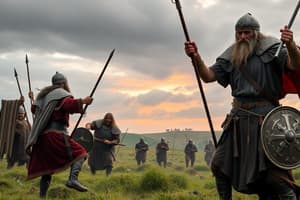Podcast
Questions and Answers
What was a consequence of walking over red-hot bars in the justice method described?
What was a consequence of walking over red-hot bars in the justice method described?
- A quick healing of wounds indicated innocence. (correct)
- Participants had the option to refuse.
- It determined the level of pain tolerance.
- It was meant to punish guilty individuals.
What role did the Catholic Church play in English society during this period?
What role did the Catholic Church play in English society during this period?
- It encouraged the construction of churches and cathedrals. (correct)
- It was less significant than local governance.
- It opposed the concept of pilgrimage.
- It facilitated social equality among genders.
Which of the following best describes the status of women during the time period discussed?
Which of the following best describes the status of women during the time period discussed?
- They were often in subservient roles with limited rights. (correct)
- They had equal rights as men.
- They only worked in religious roles.
- They chose their husbands freely.
Which major invention originated during the Song Dynasty in China?
Which major invention originated during the Song Dynasty in China?
What traditional practice among upper-class women in China indicated beauty and wealth?
What traditional practice among upper-class women in China indicated beauty and wealth?
Which Germanic tribe played a significant role in early England and introduced the Old English language?
Which Germanic tribe played a significant role in early England and introduced the Old English language?
What was the primary reason the Jutes migrated to Britain in the 5th century?
What was the primary reason the Jutes migrated to Britain in the 5th century?
What event marked the beginning of the Viking Age?
What event marked the beginning of the Viking Age?
Which factor distinguished the Mongols from other empires during their expansion?
Which factor distinguished the Mongols from other empires during their expansion?
Which of the following statements is true regarding village life in early England?
Which of the following statements is true regarding village life in early England?
What was a significant contribution of the Vikings to Britain?
What was a significant contribution of the Vikings to Britain?
How were the Mongols notable in terms of religious tolerance?
How were the Mongols notable in terms of religious tolerance?
Which of the following was a role of the lord in a village during early England?
Which of the following was a role of the lord in a village during early England?
Flashcards
Anglo-Saxons
Anglo-Saxons
Germanic tribes who migrated to Britain in the 5th and 6th centuries, establishing kingdoms and influencing English language and culture.
Jutes
Jutes
Germanic people, similar to Anglo-Saxons, who settled in Kent, impacting local culture and language during the 5th century.
Vikings
Vikings
Scandinavian seafarers and warriors who raided and settled in Britain from the 8th to 11th centuries, significantly impacting place names.
Mongols
Mongols
Signup and view all the flashcards
Early England (society)
Early England (society)
Signup and view all the flashcards
Viking Age
Viking Age
Signup and view all the flashcards
Genghis Khan
Genghis Khan
Signup and view all the flashcards
Trial by ordeal
Trial by ordeal
Signup and view all the flashcards
Medieval England Justice System
Medieval England Justice System
Signup and view all the flashcards
Women's Role in Medieval England
Women's Role in Medieval England
Signup and view all the flashcards
Importance of Religion in Medieval England
Importance of Religion in Medieval England
Signup and view all the flashcards
Imperial China's Self-Image
Imperial China's Self-Image
Signup and view all the flashcards
Chinese Dynastic Innovations
Chinese Dynastic Innovations
Signup and view all the flashcards
Study Notes
Anglo-Saxons
- Germanic tribes migrated to Britain in the 5th and 6th centuries
- Introduced Old English, the foundation of modern English
- Established kingdoms like Wessex and Mercia
- Influenced England's language, culture, and early society
Jutes
- Similar to the Anglo-Saxons
- Germanic people from areas in present-day Germany and Denmark
- Migrated to Britain in the 5th century
- Primarily settled in Kent
- Contributed to Britain's early cultural diversity, influencing local language and culture
Vikings
- Originated from Scandinavia (Denmark, Norway, Sweden)
- Known for seafaring skills and warrior culture
- Raided Lindisfarne in 793 CE, marking the start of the Viking Age
- Invaded Britain for wealth, trade, and settlement
- Influenced place names that remain today
Mongols
- Nomadic people originating from Mongolia
- Expanded empires through conquest, including parts of Asia and Europe
- Led by Genghis Khan
- Known for horseback riding and archery
- Built the largest land empire in history
- Improved trade routes (e.g., Silk Road)
- Allowed different religions within their empire
- Granted women more rights compared to other empires
England
- Poor road quality; primary transportation was by boat
- Lord held significant power in villages, collecting taxes and maintaining order
- Communities heavily influenced by the lord's presence and their manor houses
- Penalties for tax evasion could involve physical punishment and humiliation
- Trial by ordeal, a method involving tests, was used to determine guilt or innocence
Catholic Church
- Powerful institution, leading to construction of many churches and cathedrals
- Pilgrimages to religious sites were common
- Canterbury was a significant pilgrimage site
China
- Emperor Qin established the Great Wall and Terracotta Warriors in the 3rd century BCE
- Viewed itself as the "Middle Kingdom," the center of the world
- Confucianism shaped Chinese society focusing on respect, harmony, and family
- Song Dynasty (960-1279 CE) brought advancements in printing, farming, metalwork, gunpowder, paper money, and the compass, impacting cultural and economic development
- Foot binding was a practice to display wealth and beauty but often resulted in disability
Studying That Suits You
Use AI to generate personalized quizzes and flashcards to suit your learning preferences.




